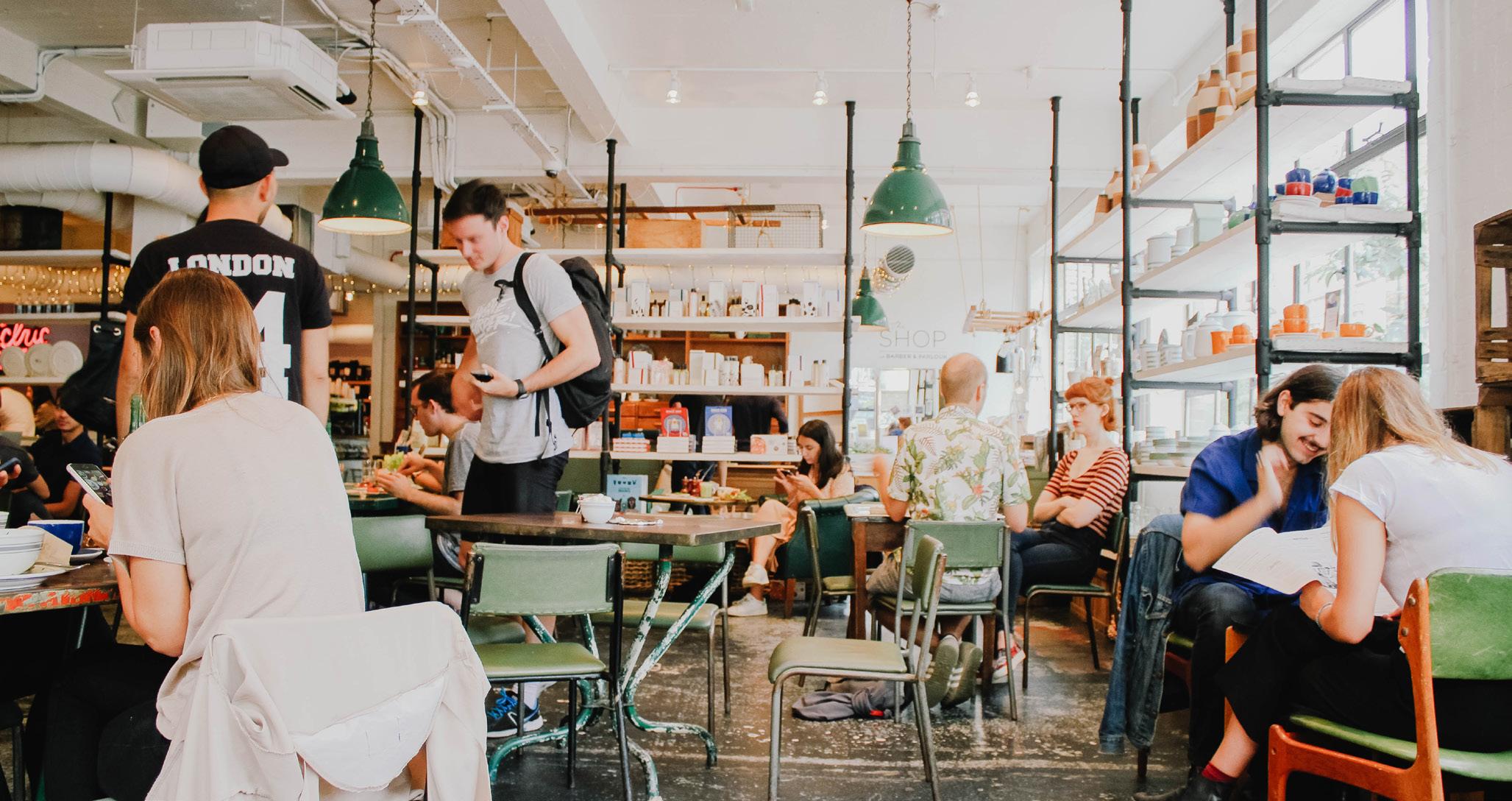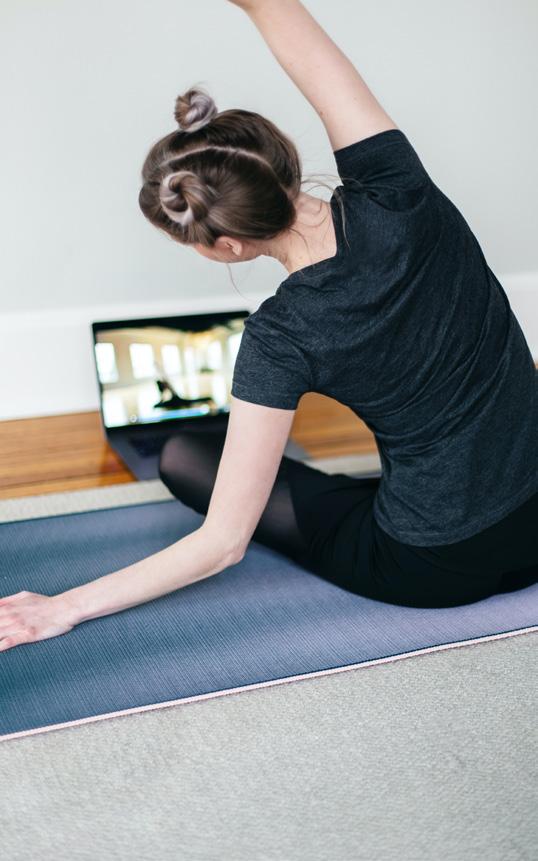
10 minute read
A Guide for Diversifying Our Social Circles and Keeping in Touch with Reality
by nicolette tour | design by rachel kwan
In our current world, socializing looks significantly different from before. While social distancing has granted many of us the time to discover more about ourselves and recognize the activities that captivate our minds, it has also caused us to self-isolate to some extent. Given today’s unique circumstances, it is important to be aware of the benefits that social connection has on our wellbeing, but it is even more important to recognize that remaining connected with others during this time is far from impossible.
Advertisement
As humans, we thrive on social interactions. While you may feel like you are constantly surrounded by the same people, it is possible to diversify your social circle, both by fostering new relationships and by doing different activities with the people you already know. This article will suggest social activities to share with the people you already know as well as conversation starters to foster new relationships with individuals of all backgrounds and interests. It will dive into the benefits of maintaining your relationships and diversifying your social circle. As we transition back to our pre-pandemic social lives, it is important to build on the connections we have and get ourselves reaccustomed to engaging with a variety of people.
The Social Aspect of Our Well-Being
We have all been told time and time again that incorporating movement and a healthy diet into our routines will set us up for good health. Many of us have become so focused on diet and exercise that we only pay conscious attention to these two components of our well-being. In reality, health goes far beyond nutrition and exercise. How many of us acknowledge that social connection is just as critical? Our "peace and security is dependent on the complete cooperation of individuals," and it is only in our power to provide this imperative social support for others and ourselves. In fact, a Stanford Medicine research article found that “higher self-esteem and greater empathy” resulting from increased social connection is associated with lower levels of anxiety and depression. A reason for this positive association between social interactions and mental health is that humans are more likely to trust individuals who prioritize social connection. This results in a positive feedback loop of social support and increased emotional and physical well-being: the more devoted we are to nurturing our relationships, the more likely we are to receive that same social support. This boosts our mood and lowers our stress levels, prompting us to engage in social situations more often and partake in this cycle of reciprocated trust and connection.
Our development as social beings can be further explained by evolutionary factors. We have been conditioned to need some level of social connectedness, because of the necessary benefits of human connection. Psychologist Susan Pinker explains that when we communicate with people face-to-face, “parts of our nervous system release neurotransmitters that lower our cortisol to regulate our response to stress and anxiety." In this way, increasing our social interactions makes us more resilient to stress factors in the long run. This strong connection between social interaction and well-being gives clear evidence that we cannot let socializing fall to the bottom of our priority lists. Instead, it is important that we stay connected to our communities, and create quality relationships that will help us feel supported in the long-run.

The Importance of Diversifying Our Social Circles
The community that we are born into and the societies that we navigate throughout our lives shape our outlook on the world; It is important to expand this outlook so that we could expand the resources with which we approach life. Research specifically supports that it’s not only social interaction that improves our health, but also membership in a diverse social network. The association between expanding our social circles and our health is said to be driven by two processes: (1) being a part of more than a single community, each devoted to a specific interest or background and (2) expanding one’s social network over time. The first stresses the importance of exposing ourselves to various value systems and approaches to life. The latter is where the ability to hold conversations with a diversity of individuals comes into play. Keeping both processes in mind, if we commit to diversifying our social circles and become open to interacting with people of different backgrounds than our own, we can develop a curiosity that has the power to change our perspectives. By expanding my horizons, I have been able to witness the opportunities and pathways that exist among many different cultures and communities, and I have been inspired by the strength and independence of individuals of upbringings far different from that of my own. The more that I expose myself to individuals who pursue life in different ways, the more open minded I become when approaching hardship or when making impactful decisions. By expanding our views of the world, we will be able to take a step back, rearrange our priorities, and gain a sense of freedom to determine our own happiness.
I experienced this shift in perspective while entering a new phase of my life at UCLA. Having grown up in a tight-knit community where I attended a religious private school, I was never fully aware of communities beyond my own. I was unaware of the different cultures, value systems, and lifestyles that people held just a few miles from my small bubble in Los Angeles. At times, I felt stuck in this bubble. I hadn’t questioned the beliefs that my tight-community had instilled me with, and as a result, I felt a lack of freedom of choice to pave my own path. I yearned to break out of this bubble and enter new social circles, as my mental health was on the line. I needed to meet new people of all backgrounds, and when joining the diverse community at UCLA, I was determined to join any club that piqued my interest and start productive conversation about topics as heavy as the pressing racial injustice taking place around the world or as light as our favorite shops in town. By expanding my social circle, I was able to gain a wider perspective of the world around me; this new perspective gave me the knowledge and tools to increase the quality of my relationships, my overall happiness, and my quality of life. Only when I had expanded my knowledge of the different individuals and communities around me was I able to recognize that although I come from a particular community or background, that background is a part of me but should not limit my mindset in life; I learned to only take with me the values that served me and let go of those that prevented my growth and happiness. I was able to acknowledge all the customs and values that my community had given me, rather than feel trapped by the tightness of it, and simultaneously find new beliefs that aligned with my individual values. Expanding my social circles and observing how people from different backgrounds approached life allowed me to not only expand my support system but also find a new sense of freedom.
Just as I had grown up in a bubble, many of us currently feel like we are living in a tiny bubble, closed off from the world as we await a return to normalcy. How can we break free when we are physically stuck at home for the majority of our days? What tools can we use to activate dormant social domains and discover new social domains, all while staying socially-distanced? After doing my own research, I have discovered multiple virtual resources that could provide an activity to bond over or facilitate fulfilling conversations. In the age of the internet, it isn’t too hard to think of creative and fun ways to socialize with friends and family while social distancing!
How to Build Your Existing Relationships
1. Have a virtual game night with these conversation-focused games: We’re Not Really Strangers, Cards Against Humanity, 20 Questions, or Two Truths and a Lie.
2. Set up a virtual book club where you and your club members explore works by authors from a variety of backgrounds and on eye-opening subjects. Book clubs may also already exist in your college or hometown community.
3. Schedule a Zoom workout session with a friend Workout videos can be easily searched on YouTube, but some of my favorites are by Pamela Reif, MadFit, and Natacha Oceane. Many gyms and studios now offer live virtual classes as well, many of which are free.
4. Bake over Facetime or Zoom.
5. Simply video call a friend during lunch or on a walk.

How to Expand Your Social Circle to Engage with Individuals of Diverse Interests and Cultures
1. Join interest groups online. This includes fitness groups, social clubs at your university or at a religious institution, sports teams, magazines, or cultural clubs.
Clubs and Organizations at UCLA: Join an ethnic club or a pre-professional club. Write or design for one of UCLA’s magazines, seek programs run by UCLA’s religious organizations, or join a community service organization.
2. Join a non-profit organization. Many organizations at UCLA or your local community have shifted to an online format, and this is a wonderful opportunity to connect with people who have similar passions as you do. Interested in tutoring students affected by the pandemic? Interested in fighting food insecurity in your neighborhood? Look into dosomething.org or LAcovidvolunteers.org if you are currently living in the LA area. Find a food bank, a program for assisting disabled persons, a religious organization, or another community service program in your local community.
3. Attend talks or webinars on a topic of interest, through a university or find one online.
4. Join a club sports team, a dance club, an acapella group, theatre group, etc., either at your university or near your neighborhood

How to Have a Fulfilling Conversation
These questions can break the ice when meeting someone new, whether it be during conversation at a club meeting, organization meeting, or during a casual conversation in any setting. While presenting these deeper questions during conversation may at first seem uncomfortable, they will allow you to better connect with your peers and will eventually seem natural.5
1. Do you consider yourself an introvert or an extrovert? 2. What activity or topic has been filling the majority of your free time recently? 3. What’s an ideal weekend for you? 4. What’s on your bucket list this year? 5. If you could change one thing about the world what would it be? 6. What did you want to be when you were younger? 7. What’s your favorite hobby to do alone? 8. What accomplishment are you most proud of? 9. What food could you not live without?
It is especially important to maintain our social connections now, so that we are not too overwhelmed when returning to social settings. Rather than isolating ourselves, we can use the present time to expand our understanding of people living beyond our own communities and our awareness of issues that may not surround us in our daily lives. By surrounding ourselves with positive individuals, we will find that their positivity will spill over into all other areas of our lives. I urge you to use the social networks and interest groups as well as the conversation-starting questions listed above to facilitate further socialization and expand your perspective of our world. The effort required to engage in a couple of the many virtual opportunities out there will certainly pay off.
References
1. "Constitution." World Health Organization. (2021).
2. “Connectedness & Health: The Science of Social Connection.” The Center for Compassion and Altruism Research and Education. (2017).
3. "Socialization: How Does It Benefit Mental and Physical Health?” Medical News Today. (n.d.).
4. "Can We Improve Our Physical Health by Altering Our Social Networks?” Perspect Psychol Sci. (2009).
5. “205 Philosophical Questions - A Huge List of Thought Provoking Questions.” Conversation Starters World. (2020).










